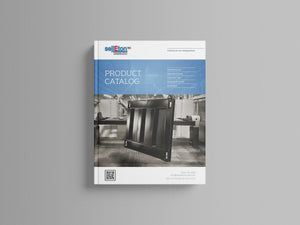
The Essential Guide to Wheelchair Accessible Scales for Inclusive Weighing Solutions
Wheelchair accessible scales are designed to weigh individuals who cannot easily transfer out of their wheelchairs. These scales are essential for accurate patient assessments in healthcare settings, ensuring both safety and dignity. This article will guide you through the features, types, and benefits of wheelchair accessible scales.
Key Takeaways
-
Wheelchair accessible scales are essential for inclusive healthcare, enabling accurate weight measurement for patients who cannot transfer from their wheelchairs.
-
Key features of high-quality wheelchair scales include a weight capacity of up to 1000 pounds, accuracy within 0.2 pounds, and accessibility components like ramps and handrails for enhanced safety.
-
Healthcare facilities must prioritize the selection of appropriate wheelchair scales to support ADA compliance and improve care quality, addressing the significant gap in usage among providers.
Understanding Wheelchair Accessible Scales
Wheelchair accessible scales are a cornerstone of inclusive healthcare, designed specifically for individuals who are unable to transfer out of their wheelchairs due to physical limitations. This equipment addresses a fundamental challenge: accurately measuring the weight of patients without requiring them to leave their wheelchairs. Traditional scales simply do not meet the needs of this patient demographic, leading to significant obstructions in their care.
The design of wheelchair scales incorporates several accessibility features to ensure ease of use and safety. These scales typically have low-profile platforms and built-in ramps, allowing patients to roll on and off with minimal effort. These features are not just about convenience—they are critical for the safety and dignity of patients with mobility impairments. Many models are highly effective, though some may have stability and weight capacity issues, which makes selecting high-quality equipment crucial.
The Americans with Disabilities Act (ADA) emphasizes the need for accessible medical diagnostic equipment, but the lack of comprehensive regulations means healthcare providers must be proactive in selecting the right tools. Equipping your facility with wheelchair accessible scales aligns with ADA compliance and demonstrates a commitment to equitable care for all patients, as outlined by the access board.
Key Features of High-Quality Wheelchair Scales
Certain features are non-negotiable when selecting a wheelchair scale to ensure reliable and accurate weight measurements. One of the primary considerations is weight capacity:
-
Many wheelchair scales are designed to support weights up to 1000 pounds.
-
This accommodates larger patients.
-
It ensures that the scale can be used for a wide range of individuals.
Accuracy is another crucial aspect. High-quality wheelchair scales offer precision within 0.2 pounds, providing accurate weight measurements. This precision allows healthcare providers to make informed decisions based on reliable data. Accessibility features like sloped ramps are also vital for ease of use. The PEC Wheelchair Scale, for example, includes these ramps to facilitate easy access for patients.
Beyond these core features, consider the overall design and durability of the scale:
-
A robust construction ensures longevity and provides stability during weighing.
-
This stability is especially important for patients with limited mobility who may need additional support during the process.
-
Handrails and stable platforms enhance safety and usability.
These features make the weighing process smoother and more secure for all users.
Types of Wheelchair Accessible Scales
Wheelchair scales come in various types, each designed to meet different needs and environments. The three main types are portable, semi-portable, and wall-mounted scales, each offering unique advantages for specific settings.
Portable wheelchair scales are ideal for facilities that require flexibility and frequent movement of equipment. Easy to transport and set up, these scales are perfect for use in multiple locations within a healthcare facility or for home healthcare providers.
Semi-portable professional unit scales device balance position positioning center optional portability and stability, providing a more permanent solution while still allowing some degree to stand of movement.
Wall-mounted scales are ideal for space-constrained environments. These scales are specifically designed to be equipped to be folded away when not in use, saving valuable floor space and keeping the shop area clutter-free in the department.
High-capacity wheelchair scales are also available, accommodating weights up to 1000 pounds, which is particularly beneficial for bariatric patients. Some models feature a ‘roll on / weigh / roll off’ design, making the weighing process seamless and efficient.
Benefits for Health Care Providers and Patients
Wheelchair accessible scales benefit both healthcare providers and patients, significantly enhancing the quality of care. For healthcare providers, accessible medical equipment like wheelchair scales is crucial for accurate medical assessments. Without these scales, providers often resort to asking patients their weight, leading to unreliable data and potentially inadequate medical care. A staggering 64.4% of physicians never use an accessible weight scale, which highlights a gap in the quality of care provided to patients with mobility issues.
For patients, accessible scales translate to improved satisfaction and safety. These scales remove barriers, allowing patients to receive accurate, dignified care without uncomfortable and potentially unsafe transfers. A handrail on some wheelchair scales provides extra support, further enhancing patient safety during the weighing process.
Despite the clear benefits, many healthcare facilities still lack accessible scales, impacting the quality of care for patients with mobility challenges. Only 22.6% of physicians’ offices consistently use accessible weight scales for patients with mobility issues, underscoring the need for wider adoption of these essential technologies.
Incorporating wheelchair scales into their clinics ensures all patients receive the high-quality care they deserve.
Selecting the Right Scale for Your Facility
Selecting the right wheelchair scale for your facility involves understanding the specific needs of your patient population and the available space. For facilities with limited space, wall-mounted scales are an excellent choice as they can be folded away when not in use, maximizing room for other activities.
When choosing scales, consider the following critical factors:
-
Durability, to ensure a long-lasting investment
-
Affordability, to fit within budget constraints
-
High weight capacity, to accommodate all potential users, including bariatric patients
ADA regulations emphasize the need for accessible medical diagnostic equipment but are not comprehensive. This places the onus on healthcare providers to ensure their equipment meets mde standards and accessibility standards, including accessible mde. Many retailers offer expert consultations to help buyers choose the most appropriate wheelchair scale for their specific requirements, ensuring the equipment aligns with both regulatory requirements and patient needs.
Installation and Operation Tips
Proper installation and operation of wheelchair scales are crucial for accurate readings and user safety. Place the scale on a flat, stable surface to enhance stability and measurement accuracy. Obstructions or debris under the scale can hinder its ability to sense weight correctly, so keep the area clear.
User training on the specific wheelchair scale model is vital for effective and safe operation. This includes understanding how to use the tare function to exclude the weight of the wheelchair, providing a precise measurement of the patient. Setting the wheelchair brakes when a patient is on the scale enhances stability during the weighing process.
Never leaving patients unattended on the scale is critical to preventing potential accidents. Regular calibration of the scale is recommended to maintain its accuracy over time. Following these tips ensures the safe and effective use of wheelchair scales in healthcare facilities.
Maintenance and Service Considerations
Maintenance and service considerations are essential for the longevity and reliability of wheelchair scales. Durability is critical, so choose scales with robust construction that can withstand frequent usage. The design of the PEC Wheelchair Scale, for example, is built sturdy with wheels for transport, making maintenance and mobility easier.
Regular calibration and servicing are crucial to ensure the scale remains accurate and functional. Following the manufacturer’s maintenance guidelines and addressing concerns promptly can prevent issues and extend the equipment’s lifespan.
Prioritizing maintenance ensures wheelchair scales provide reliable service for years to come.
Customer Feedback and Reviews
Customer feedback and reviews provide valuable insights into the performance and usability of wheelchair scales. The PEC Wheelchair Scale, for instance, has received positive feedback for its ease of installation and operation. Customers appreciate its accuracy and that it comes already calibrated, making it ready for immediate use.
However, not all review are positive. Some customers have reported issues with the functionality of certain wheelchair scales, highlighting the importance of thorough research before making a purchase.
Examining customer feedback helps healthcare providers make informed decisions and select the most suitable wheelchair scale for their needs.
Purchasing Options and Price Range
Wheelchair accessible scales are available from a variety of medical supply retailers, both online and in physical stores. Prices for these scales vary significantly, ranging from approximately $700 to over $4,000, depending on the features and specifications. Factors influencing the cost include the scale’s weight capacity, connectivity options, and additional features such as ramps and handrails.
Both stationary and portable models are available, each with different price points and suitability for various environments. Comparing options and considering the specific needs of their facility helps healthcare providers find the right wheelchair scale that fits their budget and requirements.
Summary
In summary, wheelchair accessible scales are vital for providing inclusive and accurate medical care. Their features, such as high weight capacity and precision, make them indispensable tools in any healthcare setting. By selecting the right scale, following proper installation and operation guidelines, and maintaining the equipment, healthcare providers can ensure they offer the best possible care to all patients. Investing in these scales is not just about compliance—it’s about commitment to equitable healthcare for everyone.
Frequently Asked Questions
What are wheelchair accessible scales?
Wheelchair accessible scales enable individuals with mobility impairments to be weighed while remaining in their wheelchairs, ensuring convenience and dignity in the weighing process. These scales are essential for providing accurate weight measurements for those who cannot easily transfer to standard scales.
Why are accurate weight measurements important in healthcare?
Accurate weight measurements are essential in healthcare as they facilitate precise medical assessments and treatment plans, enabling healthcare providers to effectively monitor patient health and make informed decisions.
What features should I look for in a high-quality wheelchair scale?
When selecting a high-quality wheelchair scale, prioritize high weight capacity, precision within 0.2 pounds, accessibility features like ramps, and durable construction. These elements ensure both accuracy and reliability for effective use.
How do I maintain a wheelchair scale?
To maintain a wheelchair scale effectively, it is essential to perform regular calibration, adhere to the manufacturer's maintenance guidelines, and ensure the scale is situated on a flat, stable surface. This approach will help ensure accurate and reliable measurements.
Where can I purchase wheelchair accessible scales?
You can purchase wheelchair accessible scales from medical supply retailers, both online and in physical stores. Prices typically range from $700 to over $4,000 based on the features offered.

